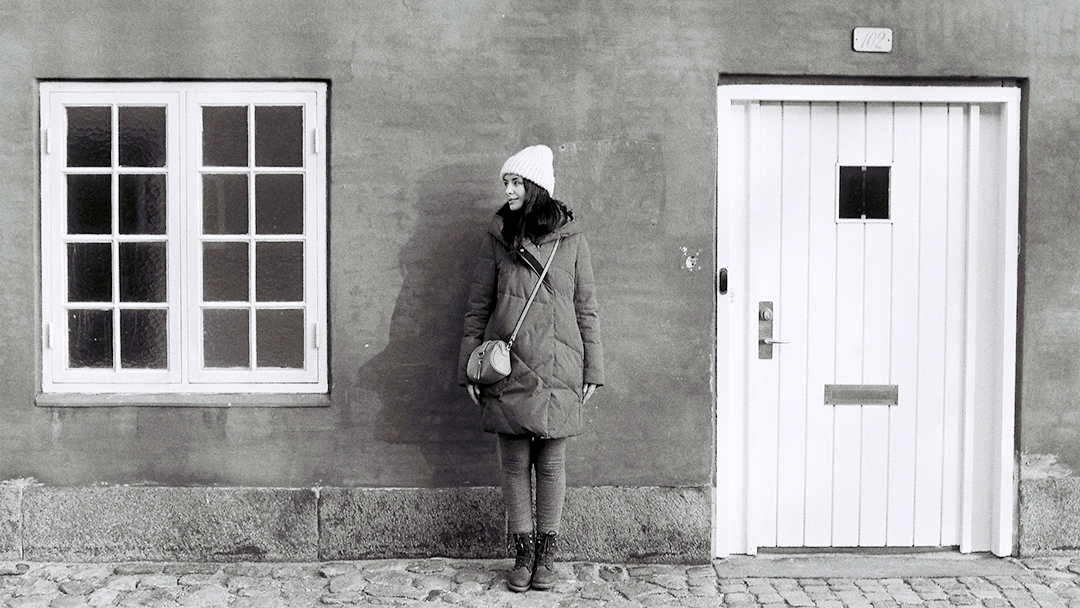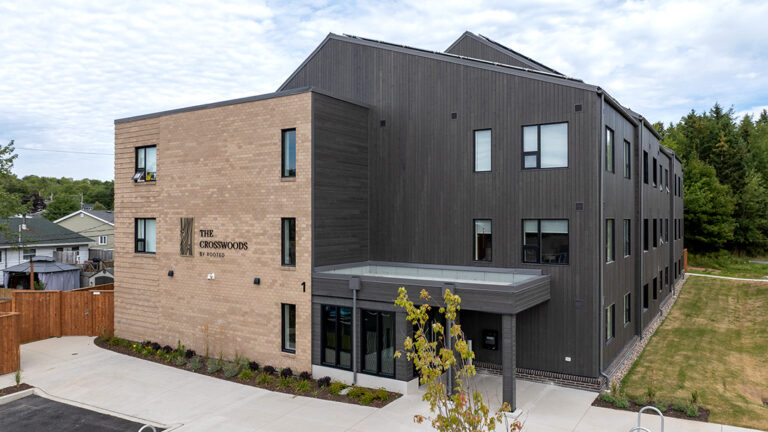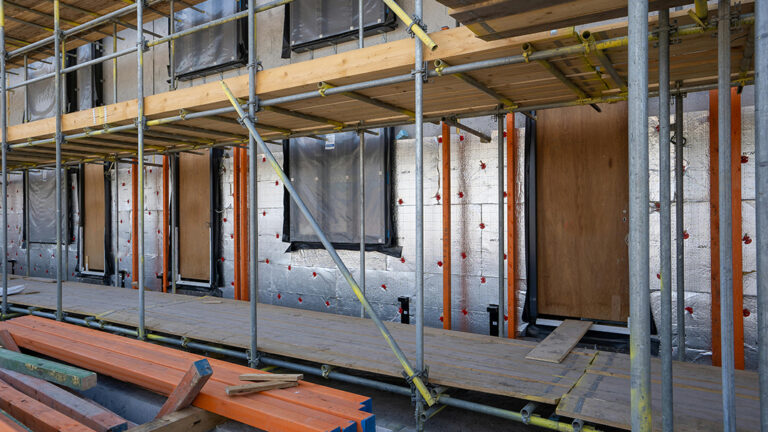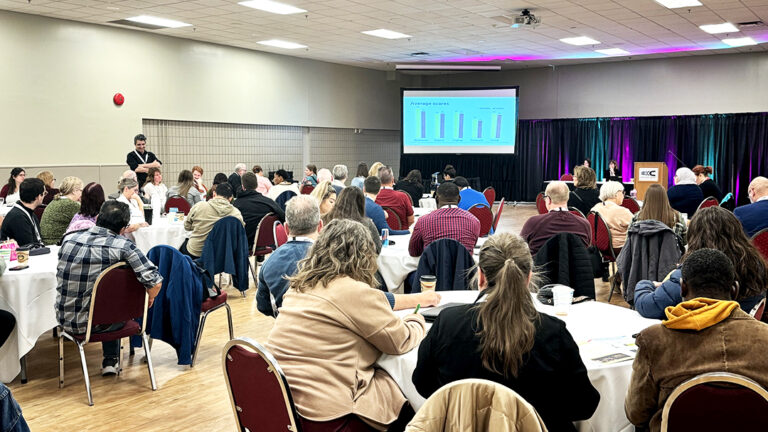While Canada’s housing crisis affects everyone, housing and homelessness issues affect women in especially severe and complex ways.
The financialization of housing has aggravated housing scarcity, the pandemic has exacerbated domestic violence, and the current rise in the cost of living puts families suffering from financial precariousness in an even more delicate situation. The severity of the housing crisis often forces women to remain in precarious housing situations that make them both physically and psychologically unsafe.
On this International Women’s Day, we’re sharing research and reflections on the meaning of housing for all, the barriers women face in accessing safe and suitable housing, the gaps in the current housing ecosystem, and initiatives that could promote change.
Home as a pillar of identity
Home isn’t just a place to live. It’s somewhere that we construct our identities, and transmit knowledge and stories between generations, as Monica Lafontaine, the Centre’s Indigenous Intern Coach explains.
No matter its size or location, a home should be a warm, caring and safe environment that’s freely chosen and shared with trusted people. Even when a home is faced with violence, it can still be very difficult to leave.
Discrimination against racialized women and mothers
Women who are struggling with issues like family responsibilities, financial difficulties, or physical and mental health issues are especially vulnerable. Their status as women is compounded by other types of oppression they may experience. Women who are racialized, Indigenous, immigrants, refugees, and/or disabled face additional, specific challenges, mentions Lisa Ker, Deputy Executive Director of the Centre.
Since women also often take care of children, many mothers stay in toxic relationships for fear of risking homelessness for themselves and their families. Because of the lack of resources and programs to help them break out of the cycle of violence, many women put their safety at risk.
Mothers also suffer discrimination from landlords who refuse to rent their accommodation to large families, or those with more precarious sources of income. It has been documented that women are more likely than men to work in minimum-wage and part-time jobs, to suffer from chronic poverty, and to take care of children in single-parent households (The Pan-Canadian Women’s Housing & Homelessness Survey, 2021).
Alison Lair, Program Manager at the Centre, explains that, in the context of a housing crisis where landlords receive many applications, women often find themselves on the losing end. Landlords have the luxury of prioritizing tenants without children and those with the highest salaries.
Homelessness among women: an underrecognized issue
Homelessness often looks different among women and gender-diverse people. Women experiencing homelessness may not be as visible in the streets as men, but they are not spared. When night falls, women experiencing homelessness are in a profoundly vulnerable position, and may choose to find accommodations within their informal networks, even if they risk becoming a victim of abuse or exploitation.
RaeChelle-Faith Hamilton, Development Manager at the Centre, explains that shelters for people experiencing homelessness are often ill-suited to women’s situations. For example, the fact that shelters are mixed-gender, or that children are not accepted may discourage some women from using shelter services. Since women’s homelessness is often hidden, women are in official statistics on homelessness, leading to a deficit of programs to meet their needs.
In its Pan-Canadian Women’s Housing & Homelessness Survey (2021), the Canadian Observatory on Homelessness finds that “The top reason women and gender diverse people lost their most recent housing was because of a breakup, with 47% reporting this experience.” Many women find themselves in a situation of dependence on their relationship. This confronts them with a losing dilemma: choosing between a toxic relationship or homelessness. Collectively, we must offer them a way out, with emergency accommodation and community housing.
Community housing as a structural solution
The Community Housing Transformation Center believes that homelessness is a human rights issue.
The right to housing must be promoted in the media and public policy, with particular attention to women and people from diverse backgrounds. Community housing is an approach that can meet a variety of needs, from emergency shelters to affordable housing.
The issue of lack of accommodations is not limited only to the first place of emergency shelters, but also extends to transitional housing. These programs allow women to find respite for around a year or two, for example to rebuild their lives as single mothers. Community housing is a structural solution for women and their children living with chronic poverty and other difficulties. Community housing by and for women makes it possible to take an approach that accounts for women’s diverse needs and realities.
Several initiatives that the Community Housing Transformation Centre has supported have proven to be excellent examples of best practices. One such example is the Crisis Shelter & Residence for women and their children who are victims of domestic violence, at the YWCA Saskatoon. This center offers 54 housing units of different types to women and their children. Its success is supported by the array of community services that residents have access to. 92% of residents who have stayed there say that they now live in stable housing, and that their personal situation is improving. Since the organization is struggling to meet demand, they are currently planning to add an additional 33 units.
The Government of Canada’s theme for International Women’s Day 2023 is: Every Woman Matters. The Community Housing Transformation Center could not agree more with this statement.
As Lisa Ker puts it, every unit of community housing that is created brings Canada a step closer to gender equity. Therefore the Centre wishes to highlight structural solutions to the systemic problem of the precariousness of women in the country.
Housing makes it possible to tackle issues of domestic violence, discrimination, homelessness, chronic poverty, and single parenthood. Since the challenges are immense, the solutions must likewise be broad, and aligned with the values we are collectively celebrating on this International Women’s Day. Community housing is a solution that brings meaning and results.
Do you have a project related to women’s housing to promote? We may have funding for you! See our list of grants here.



